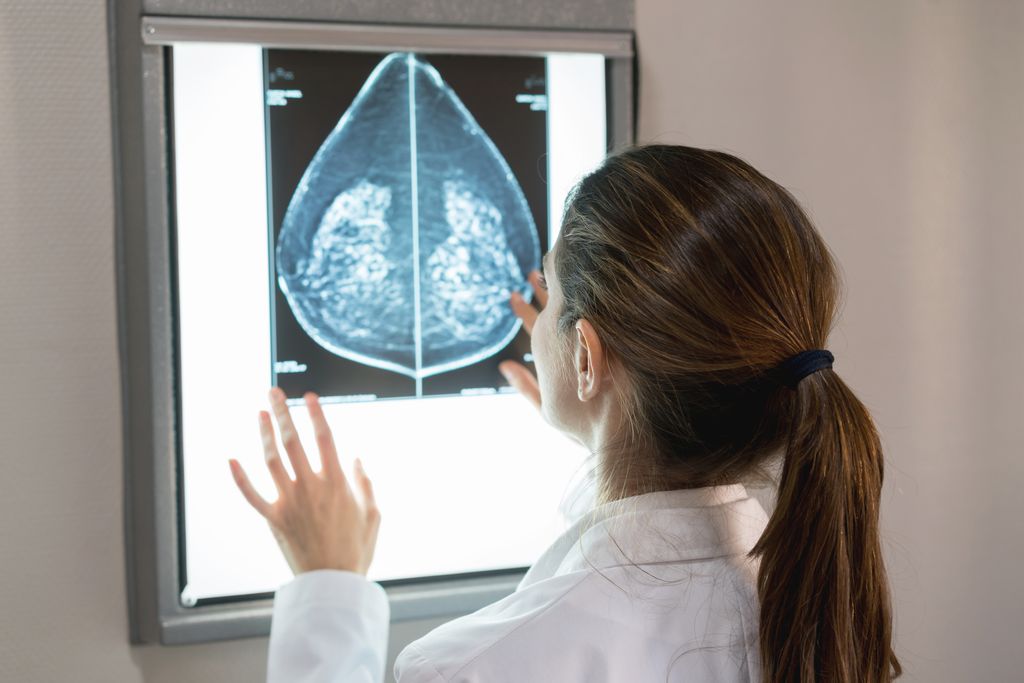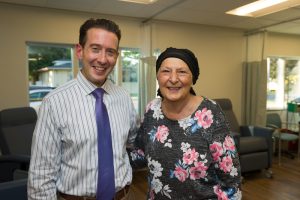
Early Signs of Inflammatory Breast Cancer
Regional Cancer Care Associates (RCCA) provides comprehensive treatment of cancer and blood disorders to patients throughout New Jersey, Connecticut, Maryland, and the Washington, DC, area.
HIPAA Alert: Potential Data Breach Learn More
Questions on Oncology, Hematology and/or Infusion Clinical Services due to COVID-19 Crisis – CALL 833-698-1623
Important Information for Our Patients Regarding the Coronavirus.
RCCA Providing Area Cancer Patients with Access to Care During Coronavirus Outbreak
RCCA Offering Patients Virtual Visits During Coronavirus Pandemic
The rate of breast cancer in Burlington County has been rising faster than almost anywhere else in the state, a fact that underscores just how important it is to be proactive by getting regular mammograms and adopting a healthy lifestyle.
“Diagnoses of breast cancer in Burlington County increased at more than twice the statewide rate and more than four times the national rate from 2013 to 2017,” said Rachel Levenbach, a breast cancer specialist with Regional Cancer Care Associates LLC (RCCA) in Moorestown and a board-certified medical oncologist and hematologist.
According to the National Cancer Institute’s State Cancer Profiles database, the incidence of breast cancer rose by 0.5% annually in New Jersey and by 0.3% annually nationally, while Burlington County saw a 1.3% annual increase.1 In fact, only Essex County had a higher rate of annual increase, at 1.9%.

Dr. Levenbach, one of five medical oncologists who practice in RCCA’s Moorestown office, said those statistics reflect what she and her co-workers are seeing.
“When people hear about trends such as this, they naturally ask, ‘Why?’ However, many factors contribute to the development of breast cancer, and there is no obvious reason why Burlington County has this unwelcome distinction,” she said. “As a result, I think the most important question actually is, ‘What? What steps can I take to lower my risk and to ensure that any breast cancer is identified early, when it can be treated most effectively?’ ”
Simple steps such as exercising regularly, not smoking and maintaining healthy eating habits to avoid obesity can help women reduce their risk for breast cancer, she said.
Dr. Levenbach shared several facts to bolster that message:
Early detection is a key factor in diagnosing breast cancer early. Mammograms at appropriate times — based on age and other risk factors — and continued follow-up, as well as other indicated screenings, are important.
Dr. Levenbach also said that even though most new cases of breast cancer are in women in their post-menopausal years, there has been a noticeable increase in diagnoses in women in their early 40s, and, in some instances, their 30s.
She recommended that women with one or more first-degree relatives or two or more second-degree relatives with breast cancer get mammograms or a magnetic resonance imaging (MRI) screening at an earlier age (determined in consultation with a physician), while women with no strong family history of breast cancer can begin annual mammograms at age 40.
“Many people may have deferred key health screenings — such as mammography, colonoscopy and skin examinations — during the height of the COVID-19 pandemic,” Dr. Levenbach said. “While I understand the concerns involved, I want to emphasize that health care facilities have adopted rigorous protocols to protect patients from the coronavirus. The increase in breast cancer cases in Burlington County that the National Cancer Institute reported occurred well before COVID-19 was an issue. We don’t want to see a further spike in cases — including cases that may be more advanced — because women waited for one year or more past their recommended date for a mammogram.”
Genetics and Breast Cancer in Younger Women
Even though many of the younger patients have a family history of breast cancer, they often do not test positive on genetic testing, which suggests that their disease is associated with a genetic mutation that hasn’t been identified yet and is not covered by the current screenings, Dr. Levenbach said.
However, the upcoming five to 10 years will likely see significant advancements in clinicians’ ability to identify various genes associated with increased risk, and the development of more therapies that target specific gene mutations driving breast cancer, Dr. Levenbach said.
Additionally, current screening panels look for far more genetic mutations than panels that were used several years ago, which means women who underwent breast cancer screening many years ago may want to talk with their physician about whether additional screening is warranted.
A Steadily Improving Outlook for Patients of All Ages
Fortunately, progress has been made when it comes to identifying the genetic basis of breast cancer, and those improvements have been matched by strides in treating the disease. Dr. Levenbach said that there are very good therapies available, and even more in the late stages of clinical development. Since it offers a full array of treatments, RCCA can individualize each patient’s care to optimal effect.
“While each woman’s situation is unique, younger patients tend to have more aggressive breast cancer,” Levenbach said. “Compared to older women, breast cancers in younger patients are more likely to test positive for a protein called human epidermal growth factor receptor 2 (HER-2), which promotes cancer cell growth. When a cancer is more aggressive, we formulate our treatment strategy accordingly, so younger patients often will have multimodal therapy, including surgery, chemotherapy and radiation. We also use hormonal therapies, as appropriate, after carefully considering and discussing with the patient the associated impact on cardiovascular and bone health, and reproductive status. Throughout treatment and afterwards, we coordinate closely with the woman’s other physicians — such as Ob/Gyns, reproductive endocrinologists and cardiologists — to ensure attention to her comprehensive well-being.”
Survival rates and quality of life have steadily improved across different age groups, breast cancer types and breast cancer stages, she said.
“While you never want to see the area where you live have an increased rate of any type of cancer, women in Burlington County — along with their counterparts across New Jersey and the country — can do a great deal to reduce their risk of breast cancer and to ensure early detection of the disease,” Dr. Levenbach said. “Patients are experiencing greatly improved outcomes, and the earlier we find and treat breast cancer, the better the outcomes tend to be. If I could leave women with one last thought on this subject, it is that breast cancer screening is safe and is potentially lifesaving.”
*******
Born and raised in New Jersey, Dr. Levenbach received her medical degree from Temple University Medical School. She completed her internal medicine residency at Temple University Hospital and conducted her fellowship training in medical oncology and hematology at Fox Chase Cancer Center/Temple University Hospital. During her residency and fellowship, she was involved in clinical research in breast cancer and gynecological malignancies. She is a member of the American Society of Clinical Oncology and American Society of Hematology, and is board-certified in internal medicine, medical oncology and hematology.
Dr. Levenbach is one of the more than 80 cancer specialists who treat patients at 20-plus RCCA care centers in New Jersey, Connecticut, Maryland and the Washington, D.C., area. Those oncology specialists see more than 22,000 new patients each year and provide care to more than 225,000 established patients, collaborating closely with their patients’ other physicians. They offer patients the latest in cutting-edge treatments, including immunotherapies and targeted therapy, as well as access to a wide range of clinical trials. In addition to serving patients who have solid tumors, blood-based cancers and benign blood disorders such as anemia, RCCA care centers also provide infusion services to people with a number of non-oncologic conditions — including multiple sclerosis, Crohn’s disease, asthma and rheumatoid arthritis — who take intravenously-administered medications.
To learn more about RCCA, call 609-807-2693 or visit Moorestown.
References
National Cancer Institute. State Cancer Profiles. Quick Profiles: New Jersey. Available at https://statecancerprofiles.cancer.gov/quick-profiles/index.php?statename=newjersey. Accessed Aug. 2, 2021.
Pizot C, Boniol M, Mullie P, et al. Physical activity, hormone replacement therapy and breast cancer risk: A meta-analysis of prospective studies. Eur J Cancer.2016; 52:138-154.
National Cancer Institute. Physical Activity and Cancer. Available at https://www.cancer.gov/about-cancer/causes-prevention/risk/obesity/physical-activity-fact-sheet#r7. Accessed Aug. 2, 2021.
Jones ME, Schoemaker MJ, Wright LB, Ashworth A, Swerdlow AJ. Smoking and risk of breast cancer in the Generations study cohort. Breast Cancer Research. 2017;19:118. Available at https://breast-cancer-research.biomedcentral.com/track/pdf/10.1186/s13058-017-0908-4.pdf. Accessed Aug. 2, 2021.
Munsell MF, Sprague BL, Berry DA, Chisholm G, Trentham-Dietz A. Body mass index and breast cancer risk according to postmenopausal estrogen-progestin use and hormone receptor status. Epidemiologic Rev.2014; 36:114-136.
National Cancer Institute. Obesity and Cancer. Available at https://www.cancer.gov/about-cancer/causes-prevention/risk/obesity/obesity-fact-sheet#r22. Accessed Aug. 2, 2021.
For more information or to schedule an appointment,
call 844-346-7222. You can also schedule an appointment by calling the RCCA location nearest you.

Regional Cancer Care Associates (RCCA) provides comprehensive treatment of cancer and blood disorders to patients throughout New Jersey, Connecticut, Maryland, and the Washington, DC, area.

When people think of breast cancer, they generally think of it affecting women. However, in rare circumstances, breast cancer can affect men, most commonly in

First diagnosed with breast cancer in 1992, she has persevered in her battle against the disease for more than 30 years.

Regional Cancer Care Associates is one of fewer than 200 medical practices in the country selected to participate in the Oncology Care Model (OCM); a recent Medicare initiative aimed at improving care coordination and access to and quality of care for Medicare beneficiaries undergoing chemotherapy treatment.